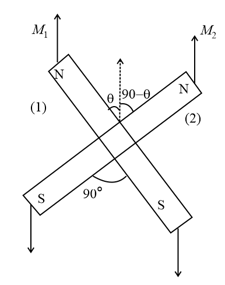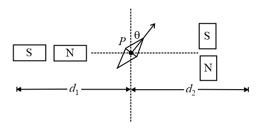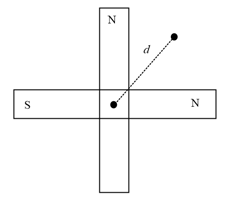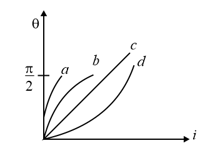K K Sharma Solutions for Chapter: Magnetism and Matter, Exercise 5: Bar Magnet
K K Sharma Physics Solutions for Exercise - K K Sharma Solutions for Chapter: Magnetism and Matter, Exercise 5: Bar Magnet
Attempt the practice questions on Chapter 2: Magnetism and Matter, Exercise 5: Bar Magnet with hints and solutions to strengthen your understanding. Chapterwise/Topicwise Daily Practice Problems (DPP) Magnetism and Electromagnetic Induction NEET solutions are prepared by Experienced Embibe Experts.
Questions from K K Sharma Solutions for Chapter: Magnetism and Matter, Exercise 5: Bar Magnet with Hints & Solutions
A cylindrical rod magnet has a length of and a diameter of . It has a uniform magnetisation of . What is its magnetic dipole moment?
Two magnets of equal mass are joined at right angles to each other as shown. The magnet has a magnetic moment times that of magnet This arrangement is pivoted so that it is free to rotate in the horizontal plane. In equilibrium, what angle will the magnet subtend with the magnetic meridian?

Two magnets and are identical and these are arranged as shown in the figure. Their length is negligible in comparison to the separation between them. A magnetic needle is placed between the magnets at point which gets deflected through an angle under the influence of magnets. The ratio of distance and will be

Two short magnets of equal dipole moments , are fastened perpendicularly at their centre (figure). The magnitude of the magnetic field, at a distance from the centre, on the bisector of the right angle, is

A value of current gives a deflection in properly arranged tangent galvanometer. If the current becomes of its initial value, then deflection in it
The magnet of a vibration magnetometer is heated so as to reduce its magnetic moment by . By doing this, the periodic time of the magnetometer will
Which graph may best represent the current vs deflection curve in a tangent galvanometer?

A magnetic needle lying parallel to a magnetic field requires unit(s) of work to turn it through . The torque needed to maintain the needle in this position will be,
